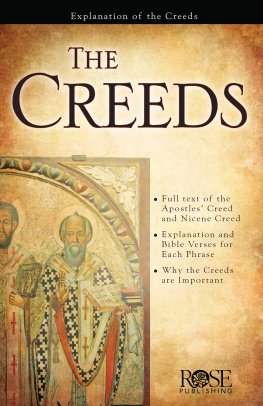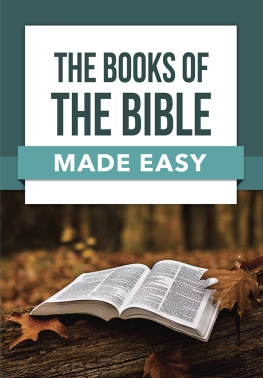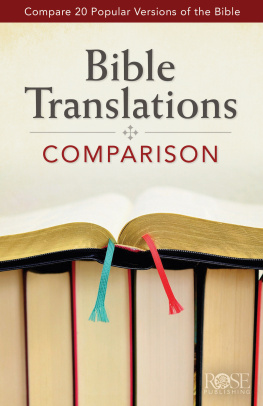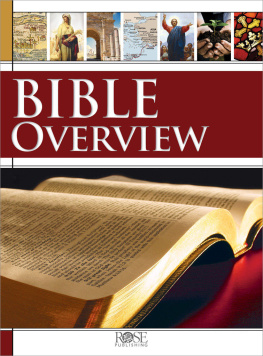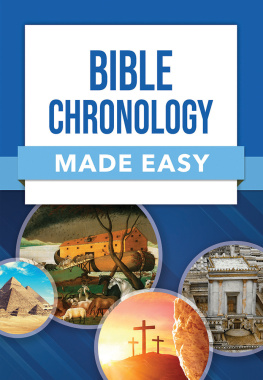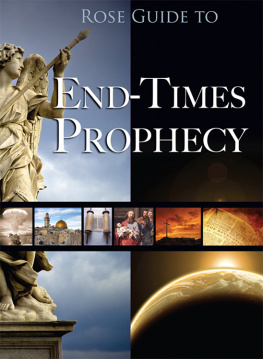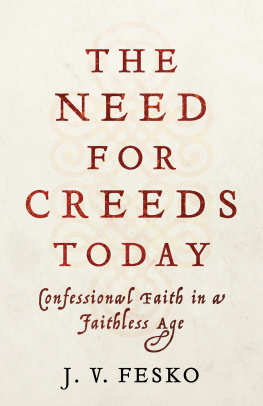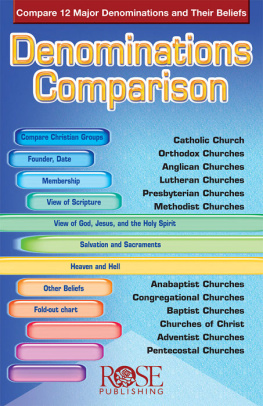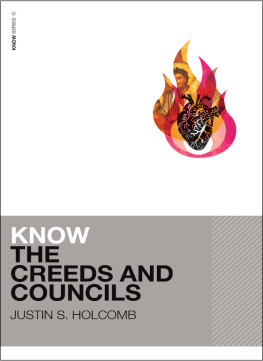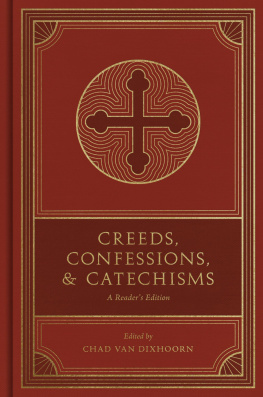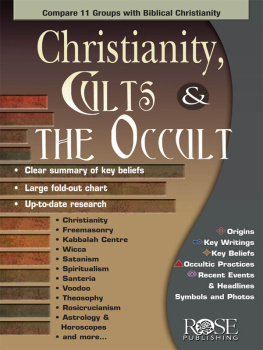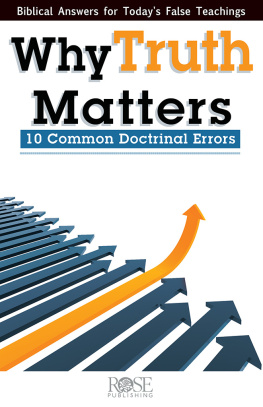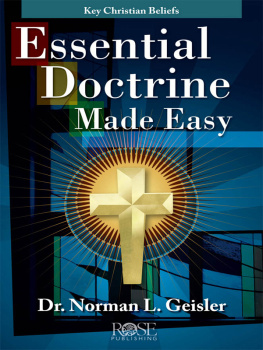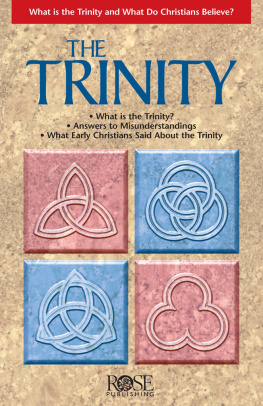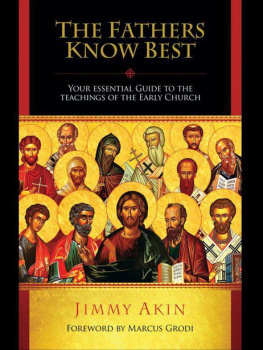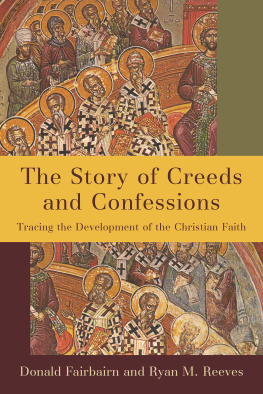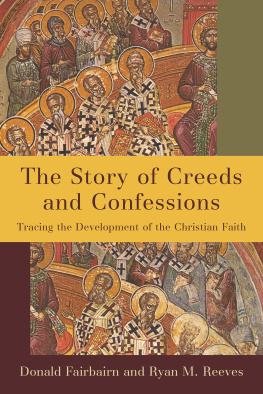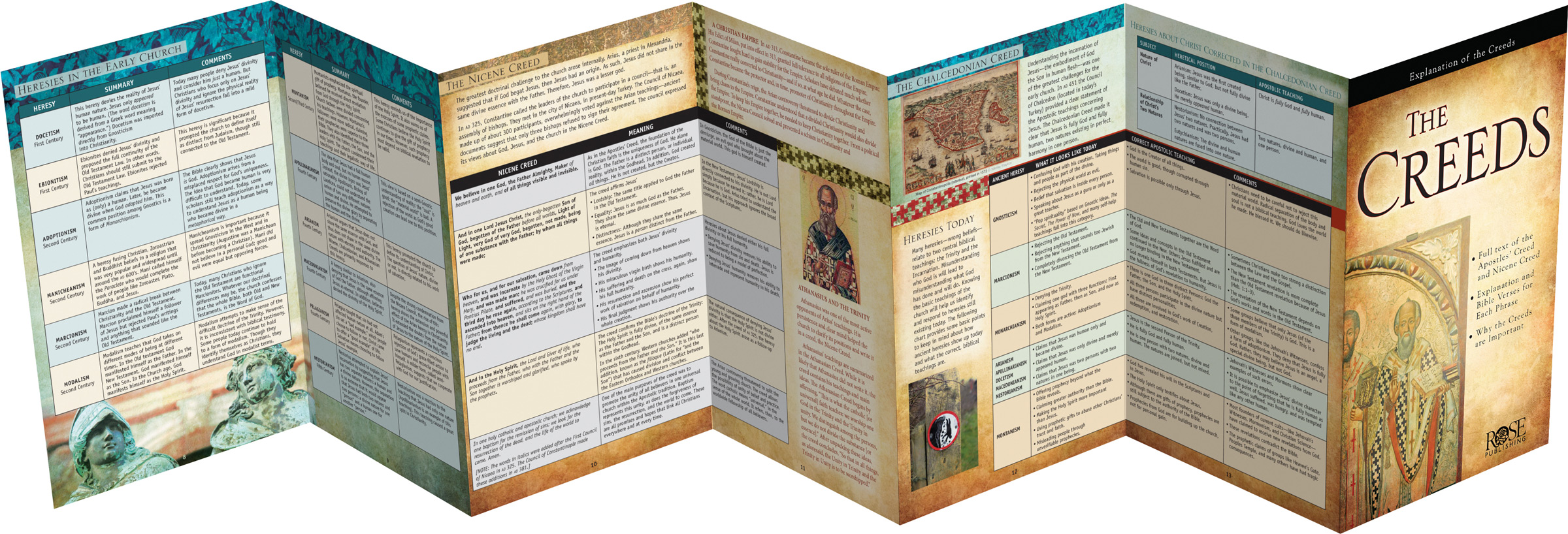The printed version of this eBook is the Creeds and Heresies pamphlet, ISBN-13: 9781596363489
Author: Benjamin Galan, MTS, ThM, Adjunct Professor of OT Hebrew and Literature at Fuller Seminary.
Special thanks to Timothy Paul Jones, PhD, Southern Baptist Theological Seminary in Louisville, Kentucky; and Paul Carden, Executive Director, Centers for Apologetics Research (CFAR).
Note: The text of the Apostles Creed and the Nicene Creed were modified from Creeds of Christendom, Vol. 1 by Philip Schaff.
All scripture quotations, unless otherwise indicated, are taken from the Holy Bible, New International Version, NIV. Copyright 1973, 1978, 1984, 2011 by Biblica, Inc. Used by permission of Zondervan. All rights reserved worldwide.
It is illegal to photocopy, transmit electronically, post on the internet, or reproduce this pamphlet in whole or in part in any form.
2009 Bristol Works, Inc.
Rose Publishing, LLC
PO Box 3473
Peabody, Massachusetts 01961-3473 U.S.A.
Email: info@hendricksonrose.com
www.hendricksonrose.com
All rights reserved.
Build: 2022-03-01 11:02:56 EPUB 2.0
The Creeds
This handy eBook:
- Explains the early church's response to ancient heresies--many of which are common in today's cultic groups and other religions in less than 30 minutes.
- Includes the full text of the Apostles Creed and Nicene Creed, and reveals why they are important to learn today.
- Includes 5 charts packed with side-by-side comparisons and fascinating facts, such as a chart comparing Gnostic misconceptions and Christian beliefs.
Where Did the Creeds Come From?
As the gospel spread in the first centuries after Jesus death and resurrection, people wondered about the beliefs of this new religion. Like today, believers then needed quick, accessible answers to questions. Early Christians formulated simple creeds that expressed essential Christian beliefs. These creeds served at least three purposes:
- Explanation of the faith. Creeds are basic, memorable statements of belief.
- Training of believers. Creeds help believers understand who they are, what they believe, and how they should act as Christians. They are like posts that delimit the boundaries of what it means to be, to believe, and live as Christians.
- Identification and correction of false teachings: Even in the first century AD , false teachers aboundedteachers who claimed to follow Jesus but who promoted a message about Jesus that differed radically from the historical accounts proclaimed by apostolic eyewitnesses. Early Christian creeds helped believers to distinguish the truth about Jesus from the alternative perspectives presented by false teachers.

Caravaggio: Crucifixion of St. Peter, Santa Maria del Popolo, Rome
What Does a Christian Believe?
Early Christians struggled to keep their faith rooted in the historical truth about Jesus Christa truth first proclaimed by apostolic eyewitnesses, then passed on through oral traditions, and recorded in the New Testament writings. By providing brief summaries of the truth about Jesus, creeds promoted unity and identity among believers in Jesus Christ.
DOCTRINE: From the Latin word doctrina , meaning teaching, learning. A doctrine is a belief that a group holds as true. Christian doctrines organize and explain the beliefs the church learns from the Bible.
CREED: From the Latin word credo , meaning I believe. Creeds are simple summaries of beliefs. They are easy to memorize and flexible to teach.
Religious Persecution
Jesus Christ is the fulfillment of Gods promises to the people of Israel. For this reason, Christianity was not simply another Jewish sect like the Pharisees and Sadducees. Early Christian writings, including the earliest of the creeds, clearly reflect efforts to demonstrate that Christian faith consummated and fulfilled the Old Testament promises of a Messiah. Eventually, this radical claim led to a separation between the church and mainstream Judaism. Some Jewish religious leaders persecuted believers in Jesus. One of these religious leadersSaul, later known as Pauleventually trusted Jesus as his Lord and Messiah.
Political Persecution
The early church also experienced persecution from the Roman Empire. The Romans were tolerant of other peoples religions to a point; because of their respect for ancient and venerable traditions, the Romans even tolerated the Jewish religion. As persecution drove believers away from Jerusalem, it became clear that Christianity was not simply another Jewish sect, and the Romans began to demand that Christians worship the Roman emperor. Christians refused to worship the Emperor and declared that Jesus alone is Lord. Christians refusal to worship the Emperor was one reason for the vicious Roman persecution in the latter half of the first century. The powerful influences of pagan cultureboth in the state religion of emperor worship and in the growing presence of Gnosticismmade it all the more important to articulate clearly what Christians ought to believe. Identifying God as the sole Creator of all things and declaring Jesus as the only Lord became an important confession for the early church.
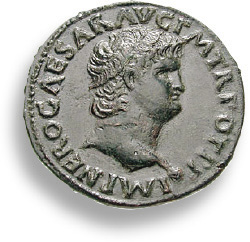
Confessing the Good News
Jesus life and ministry challenged Jewish expectations and hopes. The radical call to be transformed by the power of the Holy Spirit and live a different life is not easy to digest. New Testament writers had to stretch their knowledge and understanding. These Spirit-inspired authors presented the truth about Jesus in ways that could be understood not only by Jewish people but also in the broader Greco-Roman world and beyond. The New Testament writings and the creeds of early Christianity answered some of the challenges of the Greco-Roman world.
Today, the creeds still give us identity as Christians. They tell us the following and much more:
- What does it mean to be a Christian?
- Why is it important to believe in the Trinity?
- Why is it important that Jesus is fully God and fully human?
- What unites us as believers?
The Apostle Paul emphasizes one Lord, one faith, one baptism (Eph. 4:2). When we recite the creeds, we agree with them; and this agreement joins us in one Lordthe God of the Bible, revealed to humanity as one God in three personsand one faith: the confession of our common belief. The creeds identify us as the church, the called-out people of God.
CONFESSION: From the Latin word confiteri , meaning acknowledge. Like creeds, confessions are an active acknowledgement of the churchs faith and teachings. Often, confessions of faith include not only creedal declarations but also statements that summarize the unique teachings of a particular denomination or group of believers.

Imagine Golf
Creeds in the Bible
The Bible is a confessional document. It is Gods revelation of Gods plans for humanity. It also includes human responses to Gods revelation: praises (psalms), confessions (for example, Naamans and Peters in 2 Kings 5:15 and Matthew 16:16), petitions, and creeds. To treat the Bible as a confessional document means that Christians affirm (confess) its teachings as truthful. These confessions identify Christians as Gods people.

